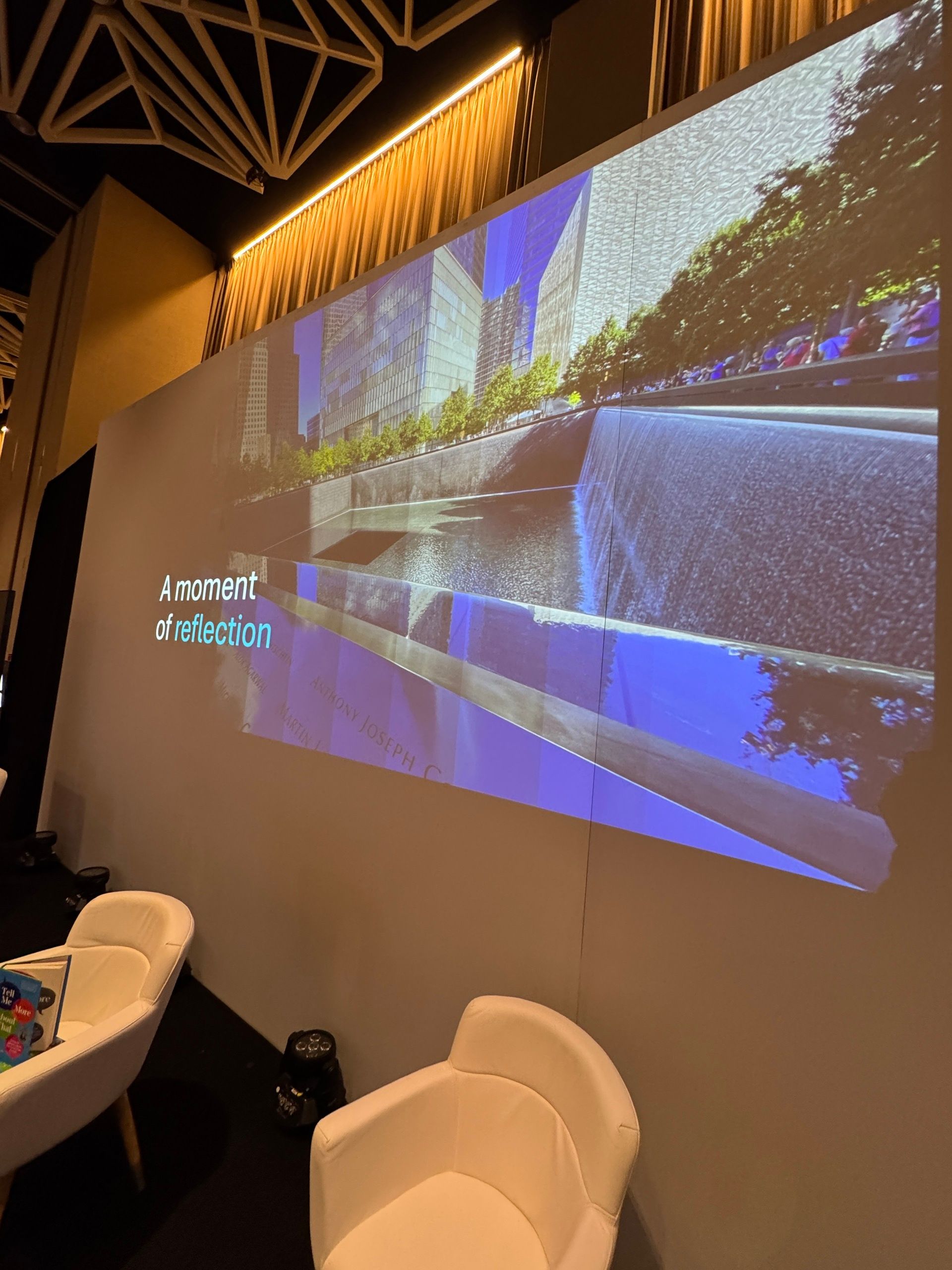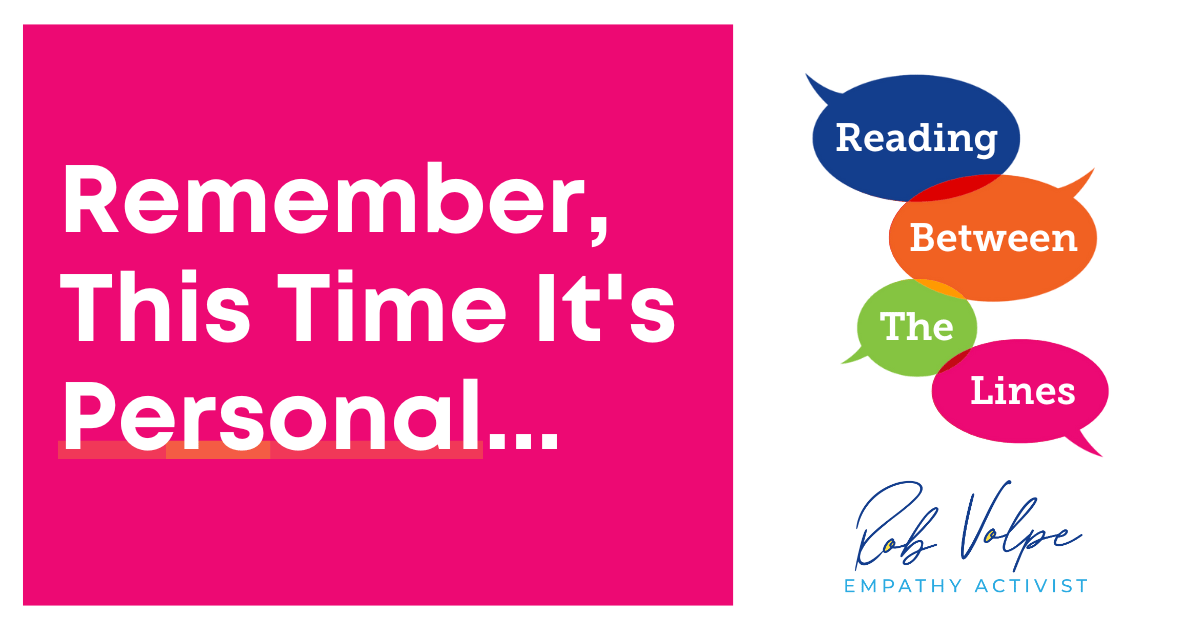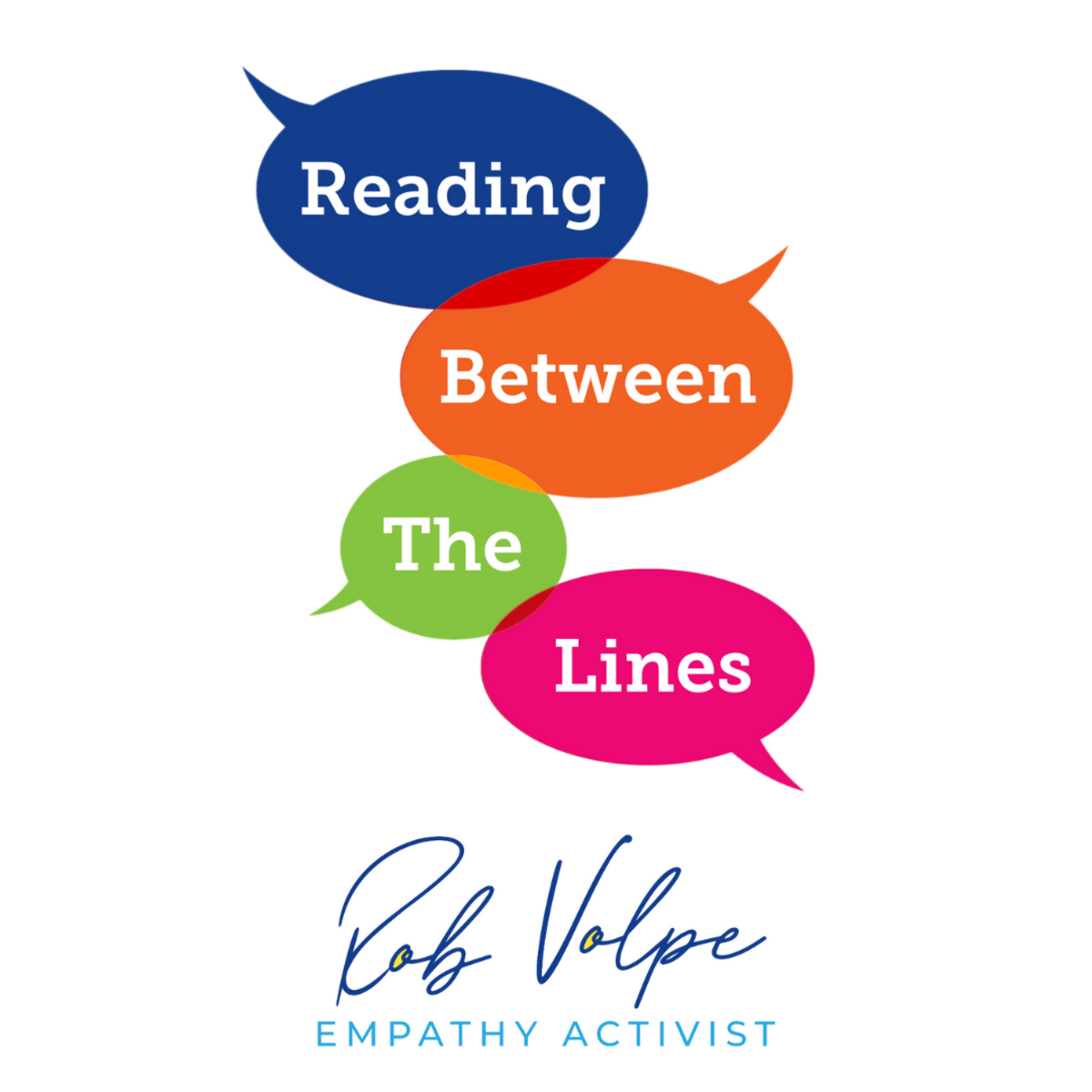⚡️TL;DR
Nearly 70% of us default to “safe” empathy roles in relationships with our friends. These roles are the Nourisher or Therapist in my Personality Archetype Quiz. Yet rarely do we choose to help grow by being in the challenging roles like Expander or Echo. That gap mirrors what’s happening in public life: when empathy fails, we slip into disconnection or even dehumanization. The assassination of Charlie Kirk reminds us that no matter how much we disagree, humanity must come first. And Jillian Michaels’ public pivot to right-wing commentator shows that empathy isn’t perfect — it’s risky, uncomfortable, and full of mistakes. But it’s also the superpower that holds us together.
Plus: Rob Spotting - upcoming September and October speaking engagements: Los Angeles; Tulare, CA; Modesto, CA
From Archetypes to Assassinations to Accountability:
Can We Stay Connected to Our Humanity?
👋 Hi friends,
Sometimes, the stories we tell about friendship and connection echo out into the public square. The ways we show up for each other — or don’t — are the same ways we show up in civic life, in politics, and in our responses to people we may not understand or even like.
This week, I want to weave together three threads:
What the Friendship Empathy Archetype Quiz is revealing so far,
The assassination of Charlie Kirk, and what it shows us about how the humanity of everyone must be respected,
Jillian Michaels’ public pivot and what it teaches us about trying, failing, and staying open to using empathy.
Together, these stories ask the same question: when empathy is tested, how do we choose to react?
Here’s the video version…
The Friendship Empathy Archetypes — What the Results Reveal
A few weeks ago, I launched the Friendship Empathy Archetype Quiz — and hundreds of you have already taken it. The results are fascinating, not because they put anyone in a box, but because they hold up a mirror to how we’re showing up in our closest relationships.
I shared last time that I typed as a Solicitor in one friendship, and as a Therapist in another — which surprised me, and also made me curious to try the quiz again with other friends in mind which I invite you do to as well.
Here’s the breakdown so far (and if you want to dig in further, I go into more detail about each archetype in the video version of this edition):
The Nourisher (44%)
Nearly half of you typed here. You’re the friends who make others feel safe, cared for, and seen. It’s a beautiful role. But there’s a cost: sometimes you put everyone else’s needs ahead of your own, and that can quietly drain you.The Therapist (24%)
About a quarter of you typed as the Therapist. You’re the space-holders and listeners, the ones people turn to when they need to talk something through. That’s a gift — but when you’re always processing someone else’s emotions, it can get heavy. Balance is key: who plays Therapist for you?The Strategist (12%)
These are the problem-solvers and planners, the ones who push conversations deeper with structure and insight. Strategists are great at helping others find a way forward, but sometimes they struggle to sit with raw emotion — slipping too quickly into “fix-it” mode.The Solicitor (10%)
This one surprised me personally. I typed as a Solicitor in one of my friendships — the friend I go to when I need support on a big life issue. Solicitors are the empathy-seekers: they want to be deeply seen and understood. It doesn’t mean they’re not also there for others — just that, in certain dynamics, they lean on being cared for.The Ghost (7%)
A smaller group typed as the Ghost — the ones who pull back when things get hard. Sometimes that withdrawal is protective. But it can also create distance. Naming this pattern lets you check in: why am I pulling away? What conversation might help close the gap?The Expander (2%)
Rare but powerful, Expanders are the disruptors. They push us outside our comfort zones, challenging us to grow, to stretch, to face truths we’d rather avoid. They can be uncomfortable — and that’s exactly why we need them.The Echo (2%)
Another rare type, the Echo reflects emotions back so the other person feels deeply understood. It’s a gift, but the risk is losing sight of their own needs in the process.
Taken together, nearly 70% of us cluster around the Nourisher and Therapist. That means a lot of safety and care — but not much stretching or challenging. Only about 14–15% typed as Strategists or Expanders, the archetypes most likely to push growth.
That imbalance raises a big question: are we so focused on comfort that we’re missing opportunities to challenge and be challenged?
👉 Here’s a thought experiment: try the quiz again, but this time, take it with someone you disagree with in mind. Maybe it’s your “crazy uncle” at Thanksgiving, or your Gen Z niece or nephew with totally different political views. Take the quiz while focusing on how you show up in that relationship. Are you still the same archetype? Do you lean into safety, or do you pull back? That’s where the deeper insights live.
How might you show up differently?
When we stretch into new ways of connecting, we not only become better friends, we become better humans.
Nearly 70% of us cluster around the roles of giving, caring, and listening — the Nourisher and the Therapist. There’s a lot of safety in that, but not nearly as much stretching or challenging.
Choosing Humanity over Cheering Death
Then came the news that jarred me into deep reflection: the assassination of Charlie Kirk.
Whatever your politics, this is a moment that demands a reckoning. When someone is killed for their voice, their visibility, their politics, no matter how much we disagree with them, no matter how much they say vile things about our community, we are forced to confront what humanity truly means to us. And that is a reflection of what we truly value.
Several people have approached me with questions about how to reconcile what happened. They express compassion for Kirk’s wife and children. Yet at the same time they see how Kirk’s rhetoric has put their own community, and therefore, themselves at risk and feeling attacked.
My response has been to help them recognize that, in the polarized and enflamed world we live in (thanks algorithm, politics as reality show, social, targeted and mainstream media and the unease built up from years of uncertainty), if we let our polarized passions eclipse our humanity, then we are reducing ourselves to that which we detest.
Cheering someone’s death isn’t democracy. It’s dehumanization.”
If we want to change the direction a person, an organization or a political party is taking, the way forward is by using our voices, our votes, and our civic participation. The path forward is not by cheering their death. The future is where empathy becomes not softness, but strength: the strength to stay human in the face of deep division.
To have empathy means we are connected to each other. It does not mean we give up our own point of view, but we see and hear the other person. We acknowledge their existence. Given the disconnectedness of our society, the loneliness crisis and the tiny bubbles we find ourselves in, it is time to make conscious decisions to connect with each other. Start the conversations so we connect, letting us see our collective humanity.
Charlie Kirk was assassinated on September 10. The next day was the anniversary of the largest terrorist attacks in the United States to date. One of the remarkable things that happened in the wake of 9/11, especially in New York City where I was living at the time, was how we all came together. The sense of community was so strong. We were all connected because we had lived through a trauma together. A knowing glance and a ‘how are you?’ was freely exchanged with strangers. In New York! The shared experience made empathy easy to feel on deep levels because we shared a common moment in time. We valued the humanity of others and ourselves.

If you choose, please take a moment in silence to remember the lives lost and reflect on how the ripples of 9/11 have affected your life, big or small. How might your life have been different had the attacks never happened?
I do not know where the ripples of the assassination of Charlie Kirk will take us. Those waves are just starting to extend from the event. We live in a world where we divide ourselves with every new event. From masking and social distancing to honoring the more than 1.2M people who died from Covid-19, How we choose to respond to these moments of crisis speaks volumes about us as people and how we value the humanity of others. And if we don’t value the humanity of others, what value does our own humanity hold?
The Messy Work of Trying to Have Empathy
Staying human also means making space for those who are trying, whether clumsily or controversially, to listen and grow.
Take Jillian Michaels. The Biggest Loser trainer turned right-wing commentator, she was embroiled in controversy this summer over remarks on CNN Tonight about slavery which were deeply hurtful and misguided. Amid the “what a nut job” attacks, an in-depth profile of her appeared in The New York Times (gift link). At first I didn’t want to read it, choosing to ‘cancel’ her and ignore her existence. But then I thought it might be interesting to see “what the hell happened” and how she got where she is.
I was struck how, in the article, she spoke about shifting politically, from left to right, beginning in 2020 as she started to question information she felt was being spoon-fed by the left without critical discussion or analysis. As she’s started her new venture, she talked about seeking to have empathy with others who have different viewpoints. Those are the conversations we need to have. Not the talking at the camera on a CNN opinion show, but listening in a meaningful way. I can get behind that because I have empathy with her desire while disagreeing with her tactics.
Jillian Michaels is not a perfect model of empathy. None of us are. But her public wrestling with change reminds us that empathy can be messy. It involves mistakes, accountability, and humility. It asks us to risk being wrong, to repair when we hurt, to keep listening even when it’s uncomfortable.
That’s not a weakness. That’s the work of staying human.
Pulling the Threads Together
So what do these stories — quiz archetypes, assassination, controversy — have in common?
In our friendships, many of us avoid the archetypes that risk discomfort.
In our politics, we sometimes forget that disagreement doesn’t erase humanity.
In our culture, we’re quick to pounce on imperfection — but slower to value accountability and growth.
The throughline? Disconnection is easy. Empathy is hard. But empathy is also where strength, resilience, and possibility live.
An Invitation for You…
Here are a few ways to put this into practice:
Notice your archetype. Are you defaulting to safety (Nourisher, Therapist), or leaning into challenge (Solicitor, Expander)? Where are you holding back? Take the quiz again thinking of a person you struggle with. Or share it with a friend and have an honest conversation on where you type with each other. Both of these will fuel personal growth.
Practice humanity across disagreement. When you encounter a political figure or friend you strongly disagree with, pause. Take a Curious Breath. Name their humanity before you name your judgment. Ideally, dismantle your judgment so that you can see their humanity.
Allow for messy growth. When you or someone else stumbles, resist the urge to cancel. Have grace. Ask: what accountability looks real here? What growth is possible? How can I support these next steps?
Unplug. Take an hour, maybe 2 and truly unplug. No social media. No internet. Instead, plug in to the humans around you. After all, they are what’s real and most important.
Because in the end, empathy isn’t about comfort. It’s about choosing connection, again and again, even when it would be easier to turn away.
I’m standing here with you. I know we can all do this.
Let me know how else I can support you.
💡 What feels hardest right now about holding empathy across difference? Email me [email protected]
Relevant Past Editions
Rob Spotting Update
I had a great time in Chicago this week speaking on evolving thinking about soundbites to utilizing storyscapes. The 5 Steps to Empathy plays a key role in this process. Once we identify our audience, we need to have awareness of what gets in their way and which of the 5 Steps can help with that. An early start turned into a nearly full house as the hour progressed. The response was very positive - “you took a complex subject and made it relatable” said one attendee while another said it left her feeling inspired. That’s what I was going for!
If you are looking for a dynamic speaker for your team, company or organization to help strengthen business results through the use of empathy, let’s talk. Email me [email protected] and we can discuss your group’s needs and a program that will fit.
I still have 3 speaking engagements in the coming weeks, including a new one that’s just been announced.
“The Paradox of Leadership: How to Be Nice and Be Respected” at PIHRA Los Angeles monthly meeting, Wednesday, September 17, 7:30-9:30am
“The Missing Link: How Empathy Drives Workplace Culture, Retention and Productivity” at SHRM-Tulare/Kings County Annual Conference, Thursday, September 25, 2025
And on October 1, I’m headlining EJ Gallo’s PRIDE ERG Diversity Summit in Modesto. Stay tuned for more details.
If you know anyone attending any of these events or that should be attending, I’d appreciate it if you passed these on. And if you might be there - please let me know!
I hope you liked this edition.
Please help spread the word - pass this newsletter along to someone you know that might also enjoy it. Either forward this email or invite them to subscribe at the click of the button below.
Thank you all for subscribing and welcome to the new members! I’m glad you are here.
The content of this newsletter is shaped by what you respond to so please email me your thoughts, questions and topics you’d like to explore with me.
As always, a quick reminder of what you can expect in each edition of Reading Between the Lines…
My thinking is here in the newsletter. Links are for diving deeper.
I strive to deliver ‘news you can use’.
I also share insights into human behavior and topics I’m thinking about.
I include amusing or interesting “slice of life” moments.
The Q&A feature is based on questions that come up in conversation - please send me your questions!
I’d like to hear your thoughts- ‘reply’ to this email or reach out directly to: [email protected]
Reading Between the Lines delivers of-the-moment insights into empathy and human behavior; expect practical tips on using the skill of empathy in everyday life and exclusive updates to keep my community close. All on a (bi)weekly basis.






